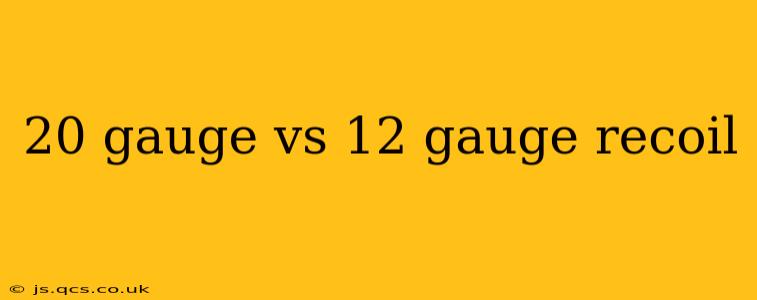Choosing between a 20-gauge and a 12-gauge shotgun often hinges on one key factor: recoil. While both are popular choices for hunting, sport shooting, and home defense, the difference in recoil can significantly impact shooter comfort, accuracy, and overall enjoyment. This comprehensive guide delves into the recoil characteristics of each gauge, helping you make an informed decision based on your needs and experience level.
What is Recoil, and Why Does it Matter?
Recoil is the backward force felt by the shooter after firing a firearm. It's a consequence of Newton's Third Law of Motion – for every action, there's an equal and opposite reaction. In shotguns, the explosive force of the propellant pushes the shot forward, while the equal and opposite force pushes the gun backward into the shooter's shoulder. Excessive recoil can lead to:
- Bruising and discomfort: Especially for novice shooters or those with sensitive shoulders.
- Reduced accuracy: The flinch reflex – anticipating recoil and involuntarily tightening muscles before firing – can significantly impact shot placement.
- Fatigue: Shooting multiple rounds with a high-recoil shotgun can quickly lead to exhaustion.
- Injury: In extreme cases, uncontrolled recoil can cause injuries to the shoulder, wrist, or face.
20 Gauge Recoil: Lighter and Gentler
The 20-gauge shotgun is generally considered to have significantly less recoil than its 12-gauge counterpart. This is primarily due to the smaller shell size and, consequently, less propellant and shot charge. This makes it an excellent choice for:
- Beginner shooters: The reduced recoil promotes better learning and allows for more comfortable practice sessions.
- Youth shooters: Younger and smaller shooters will find the 20-gauge easier to handle and control.
- Hunters pursuing smaller game: The lighter recoil allows for quicker follow-up shots, which can be crucial when hunting birds or smaller animals.
- Those with physical limitations: Individuals with shoulder or upper body issues may find the 20-gauge more manageable.
12 Gauge Recoil: Powerful but Potent
The 12-gauge shotgun is known for its powerful punch. While its greater stopping power is highly desirable in certain contexts, this comes at the cost of increased recoil. The larger shell size allows for heavier shot charges and more powerful propellant, resulting in a more substantial kick. This makes it ideal for:
- Home defense: The greater stopping power is a significant advantage in self-defense situations.
- Hunting larger game: The heavier shot charge is more effective in bringing down larger animals.
- Experienced shooters: Those accustomed to shooting heavier firearms will find the 12-gauge more manageable.
How Much Less Recoil Does a 20 Gauge Have?
The precise reduction in recoil varies depending on the specific ammunition used. However, as a general rule, a 20-gauge shotgun produces approximately 30-40% less recoil than a comparable 12-gauge. This is a significant difference that many shooters readily notice.
Which Gauge is Right for Me?
The best gauge depends entirely on individual needs and preferences. Consider these factors:
- Experience level: Beginners will typically benefit from the lower recoil of the 20-gauge.
- Intended use: Home defense might favor the stopping power of a 12-gauge, while bird hunting might be better suited to a 20-gauge.
- Physical capabilities: Shooters with physical limitations should prioritize the reduced recoil of a 20-gauge.
- Personal preference: Ultimately, the best way to decide is to try both gauges and see which one feels more comfortable and manageable.
Does Recoil Affect Accuracy?
Yes, absolutely. Excessive recoil can lead to a flinch, causing the shooter to anticipate the recoil and unintentionally alter their aim. This is especially true for novice shooters. The reduced recoil of a 20-gauge generally leads to improved accuracy, particularly for those new to shotguns.
Can You Reduce Recoil in a 12 Gauge?
Several techniques and accessories can mitigate recoil in a 12-gauge:
- Recoil pads: These add cushioning to the stock, absorbing some of the backward force.
- Lower-recoil ammunition: Reduced-recoil loads are available for 12-gauge shotguns, sacrificing some power for increased comfort.
- Proper shooting stance: Maintaining a stable and balanced stance helps control recoil.
- Practice: Consistent practice helps build muscle memory and reduces the flinch reflex.
What About 28 Gauge and .410 Bore?
While less common, the 28-gauge and .410 bore shotguns offer even lighter recoil than the 20-gauge. These are often preferred by experienced shooters seeking a particularly gentle shooting experience.
Choosing between a 20-gauge and a 12-gauge is a personal decision. By understanding the differences in recoil and considering your individual circumstances, you can select the shotgun that best fits your needs and enhances your shooting experience. Always prioritize safety and comfort when choosing a firearm.
